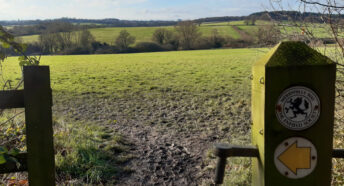Cleve Hill Solar Park: making money at the expense of the environment in the name of the environment

CPRE Kent is hugely disappointed by the government’s decision to back the building of the UK’s largest solar farm on Graveney Marshes, near Faversham.
The Planning Inspectorate announced yesterday (Thursday, May 28) that Alok Sharma, Secretary of State for Business, Energy and Industrial Strategy, had granted a Development Consent Order for Cleve Hill Solar Park.
CPRE Kent believes the industrialisation of almost 1,000 acres of the North Kent Marshes – an area of international importance to wildlife – is wholly unacceptable and further evidence of the government’s chaotic approach towards sustainable energy generation.
A coherent policy would entail solar energy becoming an integral part of housing development. Instead, the government is offering little or no incentive for that to happen, a particular irony given the thousands of new houses being targeted for the surrounding area.
This development, if it proceeds, will destroy a precious and fragile landscape, wreck natural habitat for a wide range of wildlife and inflict substantial disturbance and disruption on local people, through construction and subsequent maintenance of the site, for decades to come.
CPRE Kent is a strong supporter of renewable energy, but both the vast scale and sensitive location of this scheme mean its development should never have been accepted.
Further, there are serious safety implications for the nearby town of Faversham and village of Graveney. With energy due to be stored in a giant battery system, the threat of a potentially devastating fire should not be understated.
This is not scaremongering, as fires at battery installations across the world have proved. Of course, developers are not resourcing the local authorities and services that will be tasked with tackling the consequences of any such incidents.
Despite the promotion of Cleve Hill Solar Park as a green energy project, it is difficult to view it as anything other than a developers’ cash cow. Anything that destroys countryside and harms wildlife on this vast scale is not green energy.
Cleve Hill is all about making money at the expense of the environment in the name of the environment.
CPRE Kent will be considering its options in response to the Secretary of State’s decision.
- You can read the Examining Authority’s report and the Secretary of State’s decision letter here
Friday, May 29, 2020
- A number of important documents have yet to emerge. For example, a rigorous transport plan and a finalised air-quality assessment. The latter is critical given that allocations at Teynham will feed extra traffic into AQMAs.
- There seems to be no coherent plan for infrastructure delivery – a key component of the plan given the allocations being proposed near the already crowded Junction 7.
- There seems to have been little or no cooperation with neighbouring boroughs or even parish councils within Swale itself.
The removal of a second consultation might have been understandable if this final version of the plan were similar to that being talked about at the beginning of the consultation process. It is, however, radically different in the following ways:
- There has been a major shift in the balance of housing allocations, away from the west of the borough over to the east, especially around the historic town of Faversham. This is a move that raises many concerns.
- A new large allocation, with accompanying A2 bypass, has appeared around Teynham and Lynsted, to which we are objecting.
- Housing allocations in the AONB around Neames Forstal that were judged “unsuitable” by the council’s own officers have now appeared as part of the housing numbers.
- Most of the housing allocations being proposed are on greenfield sites, many of them on Grade 1 agricultural land – a point to which we are strongly objecting.
Concerns about the rush to submit the plan
The haste with which the plan is being prepared is especially worrying given the concentration of housing in Faversham. If the town is to take a large amount of new housing, it is imperative that the policies concerning the area are carefully worked out to preserve, as far as possible, the unique nature of the town. The rush to submit the plan is likely to prove detrimental.
As Swale does not have a five-year land housing supply, it is open to speculative development proposals, many of which would run counter to the ideas contained in the current plan. Some are already appearing. This is a common situation, and one that, doubtless, is a reason behind Swale’s haste.
Our overriding fear, however, is that this emphasis on haste is ultimately going to prove counterproductive. This is because it is our view that the plan, in its current form, is unlikely to pass independent examination. We are urging Swale to listen to and act upon the comments being made about the plan and to return the plan to the council with appropriate modifications before submitting it to the Secretary of State.
Essentially, this means treating the current consultation not as the final one but as the ‘lost’ second consultation.
The consultation ends on Friday 30 April and we strongly urge residents to make their opinions known if they have not already done so.
Further information








